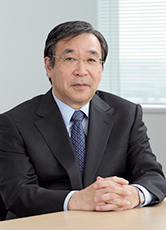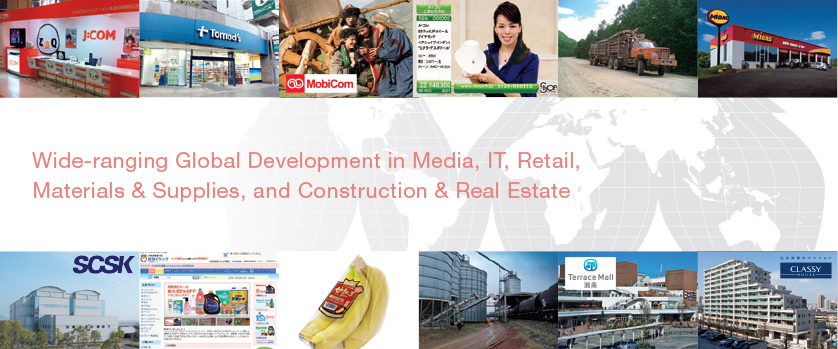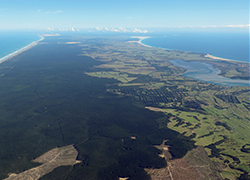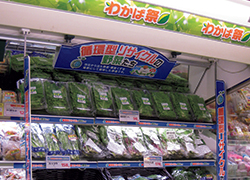Media, Network, Lifestyle Related Goods & Services Business Unit
Organization
- Planning & Administration Dept., Media, Network, Lifestyle Related Goods & Services Business Unit
- Media Division
- Network Division
- Lifestyle & Retail Business Division
- Food Business Division
- Materials & Supplies Division
- Construction & Real Estate Division
- General Construction Development & Coordination Dept.
Performance
Highlights
(Billions of yen)
| FY2011 | FY2012 | FY2013 forecast |
|
| Gross profit | 315.5 | 281.2 | 289.0 |
| Operating profit | 48.0 | 34.0 | - |
| Share of profit of investments accounted for using the equity method | 24.2 | 25.0 | - |
| Profit for the year (attributable to owners of the parent) | 51.1 | 68.9 | 49.0 |
| Total assets | 1,815.7 | 1,789.2 | - |
Message from the General Manager
 Shinichi Sasaki
General Manager, Media, Network, Lifestyle Related Goods & Services Business Unit
Shinichi Sasaki
General Manager, Media, Network, Lifestyle Related Goods & Services Business Unit
businesses.
We aim to become a core business unit with a powerful presence for the company in the non-resource field by combining these wide-ranging businesses and creating unique new value and lifestyle propositions.
To attain this vision, the business unit will work to strengthen each of its business fields further. Moreover, in the BBBO2014 medium-term management plan, we will concentrate on the development of businesses in media, e-commerce and TV shopping in the expanding consumer markets of Asia and other emerging countries, further expansion and enhancement of our food and forest resources businesses, and the development of real estate businesses involving office buildings, commercial properties, housing, and logistics facilities in strategic markets within Japan.
Business Unit Overview
Our business unit was established by merging the former Media, Network & Lifestyle Retail Business Unit and the former General Products & Real Estate Business Unit. In the media field, our business focus is on cable television (CATV) and content for multichannel broadcasting. In the network field, our business activities center on IT solutions, Internet-related business and mobile communications. In the lifestyle and retail field, our main businesses are TV shopping, supermarkets, drugstores and branded merchandise.
In the food business field, we concentrate on four commodities; grains, sugars, fresh produce, and meat. We also have a group of businesses extending from food production to quality management and sales, with a top priority on food safety and reliability, which are important to customers.
In the materials and supplies field, we are an industry leader with a portfolio including businesses in tires, ready-mixed concrete, lumber, building materials and other supplies. In the construction & real estate field, our main business pursuits are office buildings, retail facilities, housing development and sales, build-to-suit (BTS) development and real estate investment funds, as well as mixed-use development projects on a large scale.

Fiscal 2012 Results
Business Performance
Profit for the year increased ¥17.8 billion year on year to ¥68.9 billion. This was mainly attributable to a gain on the partial sale of equity in Jupiter Shop Channel Co., Ltd.
Main Investment and Loans
- Moved forward with a project redeveloping land vacated by the Kanda Campus of Tokyo Denki University
- Acquisition of automobile repair and maintenance service chain, Midas Inc., in the U.S.
Business Field Overview: What We Aim to Be
Media, IT and Retail Field
 A scene from the studio of Shop Channel, which broadcasts the sale of merchandise live, 24 hours a day, throughout the year
A scene from the studio of Shop Channel, which broadcasts the sale of merchandise live, 24 hours a day, throughout the year
- Business Environment
- The Japanese consumer market is stable and among the largest in the world. As consumer tastes and lifestyles diversify, e-commerce as a niche has continued to grow in this matured market.
Meanwhile, the purchasing power of middle-income consumers in China and Asian emerging markets has increased with economic development.
- Strengths and Strategies
- We are developing a portfolio of industry-leading business companies. This includes Jupiter Telecommunications Co., Ltd. (J:COM), which holds the top share in Japan's cable TV market, SCSK Corporation, which provides a full lineup of global IT services, and Jupiter Shop Channel Co., Ltd., Japan's largest TV shopping company. We aim to strengthen these businesses further, and develop them globally.
- Actions for What We Aim to Be
- Starting August 2013, J:COM became an equal joint venture company of Sumitomo Corporation and KDDI Corporation, with an eye to enhancing its corporate value. Meanwhile, we also plan to begin broadcasting TV shopping programs in Thailand in summer 2013. In addition, we will develop our household goods e-commerce business and drug store business overseas.
Lifestyle-related Field
 36,000 hectares of forest the Company owns in the Northland region on the northeastern tip of New Zealand
36,000 hectares of forest the Company owns in the Northland region on the northeastern tip of New Zealand
- Business Environment
- Demand for commodities such as grains, edible oil, meat and livestock feed ingredients has increased as diets have diversified and improved following economic development in the emerging markets of Asia and elsewhere. Moreover, this has led to a dramatic increase in lumber demand; notably in China, where lumber imports have increased more than tenfold in the past 10 years.
- Strengths and Strategies
- Our strengths in the food business field lie in upstream operations such as the grains business in Australia and the banana business in the Philippines.
Looking ahead, we will enhance these strengths upstream further as we expand our value chain downstream to the emerging markets of Asia, China, the Middle East and Africa, among others. Meanwhile, with a view on the Asian markets, we will enhance our forest resources along the Pacific Rim.
- Actions for What We Aim to Be
- In the food business, which is a company-wide growth field, we seek to actively develop business through collaboration with prominent business partners in the Australian frozen bread dough business and the Chinese and Vietnamese sugar processing and flour milling business, among other ventures. In the lumber business, we are acquiring more upstream resources. This includes the purchase of 36,000 hectares of New Zealand forest in fiscal 2012. In addition, we will endeavor to enhance the value of TBC Corporation, which is our tire operation.
Construction & Real Estate Field
 The Kandanishiki-cho 3-Chome Joint Reconstruction Project featuring architecture in harmony with the environment
The Kandanishiki-cho 3-Chome Joint Reconstruction Project featuring architecture in harmony with the environment
- Business Environment
- Demand for land in urban centers and prime properties has held firm in the Japanese real estate market. In addition, there is a stronger awareness of safety and security with respect to buildings and their maintenance, and environmental friendliness.
- Strengths and Strategies
- As a general property developer, we have long been engaged in the real estate business. We develop high quality properties by positioning urban centers, where demand is strong, as a strategic field, and leveraging our comprehensive strengths to develop buildings and towns that are friendly to both people and the environment.
Looking ahead, we will endeavor also to develop real estate businesses overseas, and real estate funds involving logistics facilities.
- Actions for What We Aim to Be
- In office building leasing, we began construction on the Kandanishiki-cho 3-Chome Joint Reconstruction Project, and have begun redevelopment of the Kanda area, which includes a portion of Tokyo Denki University's vacated Kanda Campus.
Together with Mori Building Co., Ltd., and a real estate investment fund, we are undertaking a major urban redevelopment project in Ginza 6-chome, Chuo Ward, Tokyo.
This project is scheduled for completion in August 2016.
CSR Through Business Activities
The Vegetable Recycling Scheme at Summit Stores
 Space dedicated to vegetables produced through the recycling scheme
Space dedicated to vegetables produced through the recycling scheme
The Summit Store food supermarket chain is operated by a Group company of Sumitomo Corporation. Since 2002 the fruit and vegetable waste generated by the stores has been separated out and recycled. The scraps are collected and transported by special vehicles to Wagoen, a farming union cooperative located in Katori City, Chiba Prefecture. At Wagoen's recycling center the waste is transformed into fertilizer, which is used to grow Wagoen-brand vegetables that are sold at Summit Stores. Initially there were times when the stores were unable to sell the vegetables due to inadequate taste or shape. After some trial and error, however, the quality has improved and 107 stores are selling the recycled produce (Japanese basil leaf, leaf lettuce and extra sweet cherry tomatoes). At some of these stores (5 stores) a special display has been set up to sell around 25 items of Wagoen's recycled produce a year, including potatoes and cherry tomatoes. Going forward, Summit Stores will continue to separate waste and increase the number of items grown to recycle and reduce fruit and vegetable waste.